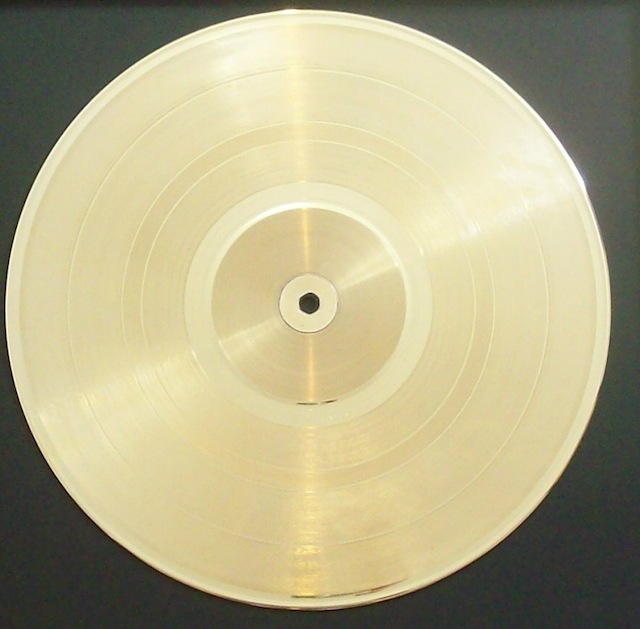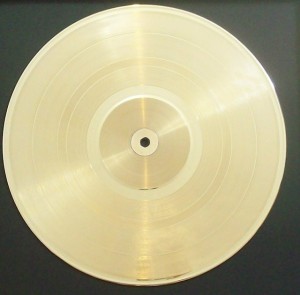Steve Knopper of Rolling Stone reports:
For 58 years, going gold was a simple matter: Sell 500,000 copies of your album or single, get a shiny record to hang on your wall. But thanks to new guidelines the Recording Industry Association of America introduced in early February, it just got easier — and more complicated.
Now, along with actual sales, the formula factors in listens on streaming services, as well as YouTube plays, and counts 10 digital-track downloads as the equivalent of one album sold; 1,500 plays on Spotify, Apple Music, Tidal or any other streaming service now count as one album sale, meaning that an LP with 750 million streams would be credited with a gold record. (The rule changes only affect albums; the RIAA began taking into account streaming data for gold and platinum singles in 2013.)
…The RIAA’s new math reflects a sea change in listening habits. Streaming revenue grew from $500 million in 2012 to more than $1 billion in 2014. Ten years ago, 90 percent of the albums on Billboard’s Top 200 sold enough copies to go gold or platinum; in 2014, just 30 percent of them did the same. Billboard updated its charts to include streaming data in 2014.
“We can’t be the same program we were 58 years ago, and even three years ago,” says Liz Kennedy, the RIAA’s gold and platinum director. “We’ll have to continue to adjust over time.” Peter Paterno, attorney for Dr. Dre, Metallica and Van Morrison, adds, “If they stick to [sales], they’re not going to have any charts in five years. If you don’t include streaming, you’re not painting an accurate picture of what’s going on.”
Not everybody is thrilled with the new rules. Larry Stessel, a former executive for major labels Sony, Mercury and EMI, says, “Streaming, to me, is no different than radio airplay, so to count it in a certification on sales doesn’t make any sense. It makes it less meaningful. There are still artists like Adele who can sell 8 million copies.”
Read more at Rolling Stone.
source: rollingstone.com



2 Responses
Streaming is similar to radio, except that you can taylor your streaming for specific bands, or genres, so in that way I think it probably should be counted.
Adele sold so many albums because she crosses genres and age groups. People who like metal like Adele, people who like country like Adele, and classical, etc… She is a megastar with a unique gift.
What blows my mind is that I constantly read comments by younger generations that if they can’t stream it on Spotify, or whatever, they’ll just download it illegally, and is a very common sentiment. I don’t comprehend that at all.
Put simply, if they ignore streaming they are ignoring a major channel as to how consumers pursue and listen to music. It is only like radio in that most often you’re not paying for it – at least directly. If a listener is specifically seeking out a song or album to play, instead of waiting for it to be selected for them by a radio station programmer, I think it’s valid to track that and count it somehow towards the artist “sales”. Maybe that’s the key – tracking how many direct searches and plays occur, vs having it mixed into something automatically like a Pandora algorithm where you select artist A so it throws in Artist B because they’re in the same genre and “you might also like” it.
They’re absolutely right that if they stick to traditional sales only, there might not be enough left to “chart” in a few years. So for they guy that says they should just stick to sales and brought up Adele – what would that mean? According to sales figures the only music that anyone listens to anymore is Adele, Beyonce and Taylor Swift? If so much of the consumer market is turning to these other channels for music content, the industry has to adapt or it will continue its decline.
It is very concerning about the younger generation now (predominantly) that seems to feel that they are entitled to all of their media entertainment for free. It’s a precarious situation because while it’s all “out there” for the taking (but not without risk), I also don’t want the internet to become an overregulated police state where we’re being watched by the FBI every time we log on (though I guess we probably already are). I grew up in a time where my favorite bands releasing a new album was almost an event – I marked the date on my calendar and went to the record store on release day, and would play the tape or disc, depending on which version I bought, over and over in my car and/or at home while reading the lyrics and all the liner notes, admiring the album art, the whole package. I still try to buy the disc when I purchase new music, because the “package” to me is part of the whole presentation. But I have a younger friend who just says “cool, I’ll torrent it tonight”. This practice is seriously hurting the economy of the music business, and I have to think making the career path far less probable for many non “megastar” artists. So is that what we should me moving towards? If you’re not the flavor of the year multi platinum superstar, you may as well pack it all up and walk away? I hope not.